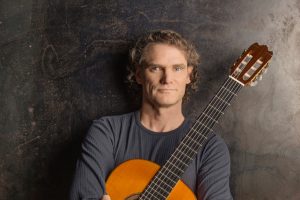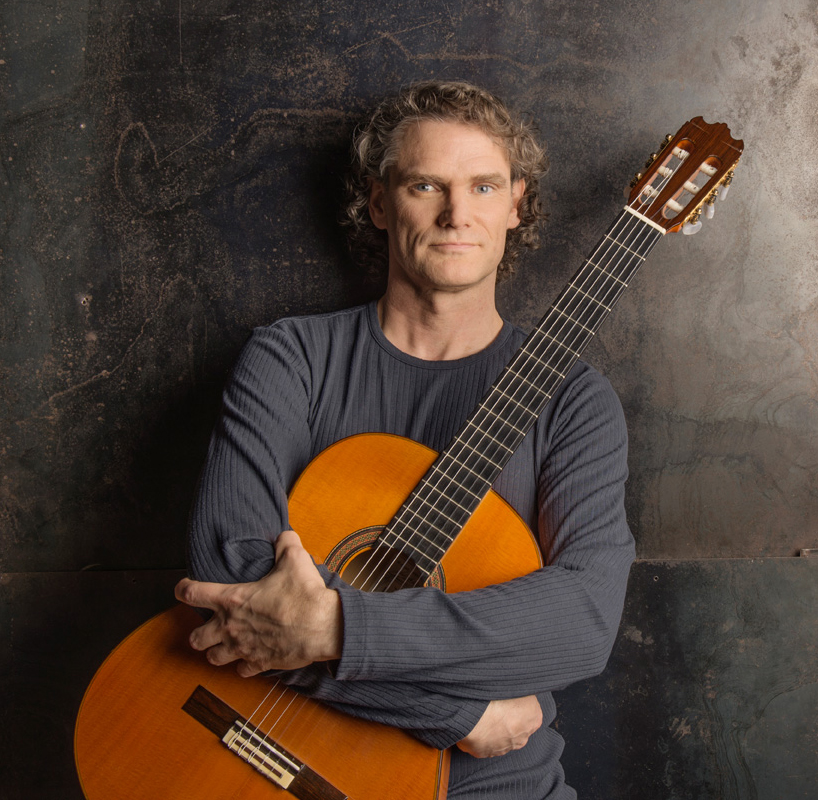
Jesse Cook
“I like music that provides a common ground for different traditions, a space where music from all historical eras and parts of the world can mingle,” Cook explains. “On this album, and One World, my last record, I began to realize that you can go anywhere on earth, without moving. There are many borders in our lives. Some have been built by others, some we create for ourselves, but whenever I ventured beyond the borders of my life, I have been the better for it. In the past few years, we’ve been moving backwards. I don’t want to focus on politics, but after the fall of the Berlin wall, Europe united and people began thinking of themselves as global citizens. The rising nationalism of today is exploiting our differences, not celebrating them. Beauty, humanity, artistry, joy, wisdom, and of course love…these things don’t stop at some line on a page. If music is the universal language, maybe there is something it can teach us?”
True to his philosophy, Cook has recorded in seven countries on three continents, collaborating with Egyptian, Columbian, Brazilian, African and Armenian musicians to develop a singular synthesis of flamenco, jazz, R&B, electronic and world music. On Beyond Borders, he found inspiration in his own backyard. “Toronto has become one of the most multi-cultural cities in the world, so I can stay home and find everything I need. We have musicians from Armenia, Greece, Spain, Columbia, India, West Africa, Cuba and Jamaica, to mention a few. You can find Brazilian samba schools and West African drum circles, so I was able to record Beyond Borders in my home studio.”
Cook was born in Paris, to Canadian parents. The family moved to Arles, where they bought a small home built in the 16th Century, for 100 dollars. “It was like stepping into the Middle Ages,” Cook recalls. “Manitas de Plata was popular then. His albums got me interested in the sound of flamenco guitar.” After moving back to Canada, Cook started guitar lessons. “My teacher played flamenco. It was as if the world conspired to get me interested in the style. When I visited my dad in France, he was living next door to Nicholas Reyes, the singer of the Gipsy Kings. I saw the gipsy kids on the corner playing guitar that way, and got hooked.”
Cook studied classical guitar at the Royal Conservatory of Music in Toronto, moving on to York University and Berklee College in Boston. Then he heard the Paco de Lucia, Al Di Meola, John McLaughlin album, Friday Night in San Francisco. “It captured their freewheeling, virtuosic spirit. I was amazed by people playing whatever they wanted, using flamenco as a foundation.”
On his albums, and in concert, Cook explored the history of flamenco, tracing its roots from India to Spain and Cuba. Along the way, he developed his signature synthesis of world music. He’s released ten genre-defying albums, garnering eleven Juno (Canada’s Grammy) nominations – and one win, in 2001 for Free Fall – in the World Music and Instrumental categories. “I write music without lyrics, so it’s a statement of pure emotion,” Cook says. “Music touches your soul, or it doesn’t, and every tradition on earth has its own way of doing that. When we venture beyond our cultural and geographic borders, we can gain the whole world.”

Jesse Cook
“I like music that provides a common ground for different traditions, a space where music from all historical eras and parts of the world can mingle,” Cook explains. “On this album, and One World, my last record, I began to realize that you can go anywhere on earth, without moving. There are many borders in our lives. Some have been built by others, some we create for ourselves, but whenever I ventured beyond the borders of my life, I have been the better for it. In the past few years, we’ve been moving backwards. I don’t want to focus on politics, but after the fall of the Berlin wall, Europe united and people began thinking of themselves as global citizens. The rising nationalism of today is exploiting our differences, not celebrating them. Beauty, humanity, artistry, joy, wisdom, and of course love…these things don’t stop at some line on a page. If music is the universal language, maybe there is something it can teach us?”
True to his philosophy, Cook has recorded in seven countries on three continents, collaborating with Egyptian, Columbian, Brazilian, African and Armenian musicians to develop a singular synthesis of flamenco, jazz, R&B, electronic and world music. On Beyond Borders, he found inspiration in his own backyard. “Toronto has become one of the most multi-cultural cities in the world, so I can stay home and find everything I need. We have musicians from Armenia, Greece, Spain, Columbia, India, West Africa, Cuba and Jamaica, to mention a few. You can find Brazilian samba schools and West African drum circles, so I was able to record Beyond Borders in my home studio.”
Cook was born in Paris, to Canadian parents. The family moved to Arles, where they bought a small home built in the 16th Century, for 100 dollars. “It was like stepping into the Middle Ages,” Cook recalls. “Manitas de Plata was popular then. His albums got me interested in the sound of flamenco guitar.” After moving back to Canada, Cook started guitar lessons. “My teacher played flamenco. It was as if the world conspired to get me interested in the style. When I visited my dad in France, he was living next door to Nicholas Reyes, the singer of the Gipsy Kings. I saw the gipsy kids on the corner playing guitar that way, and got hooked.”
Cook studied classical guitar at the Royal Conservatory of Music in Toronto, moving on to York University and Berklee College in Boston. Then he heard the Paco de Lucia, Al Di Meola, John McLaughlin album, Friday Night in San Francisco. “It captured their freewheeling, virtuosic spirit. I was amazed by people playing whatever they wanted, using flamenco as a foundation.”
On his albums, and in concert, Cook explored the history of flamenco, tracing its roots from India to Spain and Cuba. Along the way, he developed his signature synthesis of world music. He’s released ten genre-defying albums, garnering eleven Juno (Canada’s Grammy) nominations – and one win, in 2001 for Free Fall – in the World Music and Instrumental categories. “I write music without lyrics, so it’s a statement of pure emotion,” Cook says. “Music touches your soul, or it doesn’t, and every tradition on earth has its own way of doing that. When we venture beyond our cultural and geographic borders, we can gain the whole world.”
London Music Hall - CA
185 Queens Ave.
London, ON N6A 1J1
